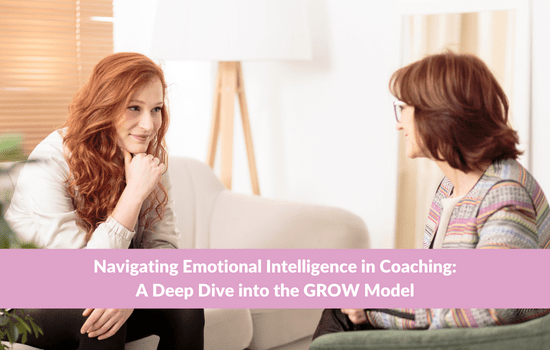Embark on a transformative journey into the intersection of coaching and emotional intelligence. Explore how the GROW Model enhances goal attainment while navigating the complexities of emotion for profound coaching outcomes.
Emotional Intelligence and Coaching: Deciphering the GROW Model

Who doesn't want to set and meet achievable goals? The GROW model unlocks the life-changing power of emotional intelligence and coaching, excelling limitations and unlocking our true potential.
Coaching With The GROW Model?
Coaching has emerged as a powerful tool for growth and transformation in the constantly evolving personal and professional development model. Pivotal to effective coaching is integrating emotional intelligence recognizing and managing emotions within oneself and others. One prominent coaching model that emphasizes emotional elements is the GROW model. Let's explore how familiarizing yourself with coaching models like GROW can enhance your coaching practice by integrating emotional intelligence.
Understanding The GROW Model
This model is relatively new, Sir John Whitmore developed the GROW model as one of the most widely used coaching frameworks. GROW is an acronym for:
- Goal: Establish clear, achievable objectives the coachee aims to accomplish.
- Reality: Assessing the current situation, identifying challenges, and understanding the goal's context.
- Options (or Opportunities): Exploring various strategies and possibilities to achieve the desired outcome.
- Way Forward (or Will): Defining concrete action steps and commitments to achieve the goal.
Emotional Intelligence Amplifies Effectiveness
It is essential to note that while the GROW model traditionally focuses on goal setting and action planning, its effectiveness amplifies when emotional intelligence is integrated throughout each stage.
Emotional Intelligence In The GROW Model
- Goal Setting with Emotional Awareness: Encouraging coachees to set goals that resonate with their values and aspirations fosters a deeper emotional connection to the outcome. Emphasizing clarity and relevance in goal setting ensures that coachees feel emotionally invested in the process.
- Reality Check with Empathy: During the reality phase, coaches leverage empathy to understand the coachee's emotions, challenges and limiting beliefs. Creating a safe space for open dialogue allows coachees to express their feelings authentically, paving the way for greater self-awareness and insight.
- Exploring Options with Social Awareness: Integrating social awareness into exploring options involves considering the impact of decisions on others and the broader context. Coaches help coachees recognize and navigate interpersonal dynamics, fostering collaboration and empathy in decision-making.
- Action Planning with Self-Regulation: In the way forward stage, coaches support coachees in developing action plans aligned with their values and strengths. By cultivating self-regulation skills, coachees can overcome obstacles, manage setbacks, and stay focused on their goals despite emotional challenges.
Beyond The GROW Model: Integrating Emotional Intelligence Holistically
While the GROW model provides a structured framework for coaching, effective coaching often requires a more holistic approach to emotional intelligence. Coaches can draw from various emotional intelligence frameworks, such as Daniel Goleman's model, which includes self-awareness, self-regulation, social awareness, relationship management, and empathy. My book, The Power of Emotion, offers many more strategies to develop emotional intelligence.
Incorporating emotional intelligence into coaching models like the GROW model enriches:
- the coaching experience
- fostering deeper insights
- meaningful connections
- sustainable growth
By familiarizing yourself with these frameworks and integrating emotional elements into your coaching practice, you can empower coachees to unlock their full potential and thrive in personal and professional domains.
I encourage you to embrace the transformative power of emotional intelligence in coaching and watch as individuals embark on a journey of self-discovery, resilience, and fulfillment to meet their goals. If you would like to learn more about the value of emotional intelligence, consider an EQ-i 2.0 Assessment to learn more.
More Motivational Reads Here »
How Emotionally Intelligent Are You?
Sign up for Linda’s monthly tips to build your Emotional Intelligence and reduce Emotional Hijacking!

















